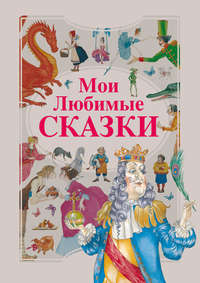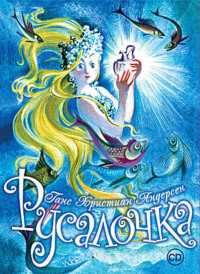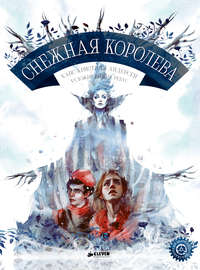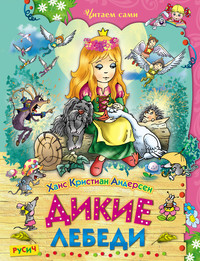 полная версия
полная версияHans Andersen's Fairy Tales. Second Series
All was quiet, and they peeped out. Alas! there on the floor lay the old mandarin. He had fallen from the table in his attempt to follow the runaways, and had broken into three pieces. His whole back had come off in a single piece, and his head had rolled into a corner. The crooked-legged field-marshal-major-general-corporal-sergeant stood where he had always stood, reflecting upon what had happened.
"This is shocking!" said the little shepherdess. "My old grandfather is broken in pieces, and we are the cause of it," and she wrung her little hands.
"He can be riveted," said the chimney sweep; "he can certainly be riveted. Do not grieve so! If they cement his back and put a rivet through his neck, he will be just as good as new, and will be able to say as many disagreeable things to us as ever."
"Do you really think so?" asked she. Then they climbed again up to the place where they had stood before.
"How far we have been," observed the chimney sweep, "and since we have got no farther than this, we might have saved ourselves all the trouble."
"I wish grandfather were mended," said the shepherdess; "I wonder if it will cost very much."
Mended he was. The family had his back cemented and his neck riveted, so that he was as good as new, only he could not nod.
"You have become proud since you were broken to shivers," observed the crooked-legged field-marshal-major-general-corporal-sergeant, "but I must say, for my part, I don't see much to be proud of. Am I to have her, or am I not? Just answer me that."
The chimney sweep and the shepherdess looked most piteously at the old mandarin. They were so afraid that he would nod his head. But he could not, and it would have been beneath his dignity to have confessed to having a rivet in his neck. So the young porcelain people always remained together, and they blessed the grandfather's rivet and loved each other till they were broken in pieces.
THE DROP OF WATER
YOU know, surely, what the microscope is – that wonderful little glass which makes everything appear a hundred times larger than it really is.
If you look through a microscope at a single drop of ditch water, you will see a thousand odd-looking creatures, such as you never could imagine dwelled in water. They do not look unlike a whole plateful of shrimps, all jumping and crowding upon each other. So fierce are these little creatures that they will tear off each other's arms and legs without the least mercy, and yet after their fashion they look merry and happy.
Now there was once an old man, whom his neighbors called Cribbley Crabbley – a curious name, to be sure, which meant something like "creep-and-crawl." He always liked to make the most of everything, and when he could not manage it in the ordinary way, he tried magic.
One day he sat looking through his microscope at a drop of water that had been brought from a neighboring ditch. What a scene of scrambling and swarming it was, to be sure! All the thousands of little imps in the water jumped and sprang about, devouring each other, or tearing each other to bits.
"Upon my word this is really shocking. There must surely be some way to make them live in peace and quiet, so that each attends only to his own concerns." And he thought and thought, but still could not hit upon any plan, so he must needs have recourse to conjuring.
"I must give them color so that they may be seen more plainly," said he. Accordingly he poured something that looked like a drop of red wine – but which in reality was witch's blood – upon the drop of water. Immediately all the strange little creatures became red all over, and looked for all the world like a whole town full of naked red Indians.
"Why, what have you here?" asked another old magician, who had no name at all, which made him even more remarkable than Cribbley Crabbley.
"If you can find out what it is," replied Cribbley Crabbley, "I will give it you; but I warn you you'll not do so easily."
The conjurer without a name looked through the microscope, and it seemed to him that the scene before him was a whole town, in which the people ran about naked in the wildest way. It was quite shocking! Still more horrible was it to see how they kicked and cuffed, struggled and fought, pecked, bit, tore, and swallowed, each his neighbor. Those that were under wanted to be at the top, while those that chanced to be at the top must needs thrust themselves underneath.
"And now look, his leg is longer than mine, so off with it!" one seemed to be saying. Another had a little lump behind his ear, – an innocent little lump enough, – but it seemed to pain him, and therefore the others seemed determined that it should pain him more. So they hacked at it, and dragged the poor thing about, and at last ate him up, all on account of the little lump. One only of the creatures was quiet, a modest little maid, who sat by herself evidently wishing for nothing but peace and quietness. The others would not have it so, however. They soon pulled the little damsel forward, cuffed and tore her, and then ate her up.
"This is uncommonly droll and amusing!" said the nameless magician.
"Yes. But what do you think it is?" asked Cribbley Crabbley. "Can you make it out?"
"It is easy enough to guess, to be sure," was the reply of the nameless magician; "easy enough. It is either Paris or Copenhagen, or some other great city; I don't know which, for they are all alike. It is some great city, of course."
"It is a drop of ditch-water," said Cribbley Crabbley.
THE SWINEHERD
THERE was once a poor prince who had a kingdom, but it was a very small one. Still it was quite large enough to admit of his marrying, and he wished to marry.
It was certainly rather bold of him to say, as he did, to the emperor's daughter, "Will you have me?" But he was renowned far and wide, and there were a hundred princesses who would have answered, "Yes," and, "Thank you kindly." We shall see what this princess said. Listen!
It happened that where the prince's father lay buried there grew a rose tree, a most beautiful rose tree, which blossomed only once in five years, and even then bore only one flower. Ah, but that was a rose! It smelled so sweet that all cares and sorrows were forgotten by those who inhaled its fragrance!
Moreover, the prince had a nightingale that could sing in such a manner that it seemed as if all sweet melodies dwelt in her little throat. Now the princess was to have the rose and the nightingale; and they were accordingly put into large silver caskets and sent to her.
The emperor had them brought into a large hall, where the princess and the ladies of the court were playing at "Visiting." When she saw the caskets with the presents, the princess clapped her hands for joy.
"Ah, if it should be a little pussy cat," exclaimed she. Instead, the rose tree, with its beautiful rose, came to view.
"Oh, how prettily it is made!" said all the court ladies.
"It is more than pretty," said the emperor; "it is charming."
The princess touched it and was ready to cry. "Fie, papa," said she, "it is not made at all. It is natural!"
"Fie," said all the court ladies; "it is natural!"
"Let us see what the other casket contains before we get into bad humor," proposed the emperor. So the nightingale came forth, and sang so delightfully that at first no one could say anything ill-humored of her.
"Superbe! charmant!" exclaimed the ladies, for they all used to chatter French, and each worse than her neighbor.
"How much the bird reminds me of the musical box that belonged to our blessed empress!" remarked an old knight. "Oh! yes, these are the same tunes, the same execution."
"Yes, yes!" said the emperor, and at the remembrance he wept like a child.
"I still hope it is not a real bird," said the princess.
"Yes, it is a real bird," said those who had brought it.
"Well, then, let the bird fly," returned the princess. And she positively refused to see the prince.
However, he was not to be discouraged. He stained his face brown and black, pulled his cap over his ears, and knocked at the door of the castle.
"Good day to my lord the emperor," said he. "Can I have employment here at the palace?"
"Why, yes," said the emperor. "It just occurs to me that I want some one to take care of the pigs, there are so many of them."
So the prince came to be the imperial swineherd.
He had a miserable little room, close by the pigsty, and here he was obliged to stay; and he sat the whole day long and worked. By evening he had made a pretty little saucepan. Little bells were hung all around it; and when the pot was boiling, the bells tinkled in the most charming manner, and played the old melody,
"Ach, du lieber Augustin,Alles ist weg, weg, weg."But what was still more curious, whoever held his finger in the smoke of this saucepan, at once smelled all the dishes that were cooking on every hearth of the city. This, you see, was something quite different from the rose.
Now the princess happened to walk that way with her court ladies, and when she heard the tune she stood quite still and seemed pleased, for she could play "Dearest Augustine." It was the only piece she knew, and she played it with one finger.
"Why, that is the piece that I play on the piano!" said the princess. "That swineherd must certainly have been well educated. Go in and ask him the price of the instrument."
So one of the court ladies had to go in, but she drew on wooden slippers first.
"What will you take for the saucepan?" inquired the lady.
"I must have ten kisses from the princess," said the swineherd.
"Heaven preserve us!" exclaimed the maid of honor.
"I cannot sell it for less," answered the swineherd.
"Well, what does he say?" asked the princess.
"I cannot tell you, really," replied the lady. "It is too dreadful."
"Then you may whisper it." So the lady whispered it.
"He is an impudent fellow," said the princess, and she walked on. But when she had gone a little way, the bells again tinkled prettily,
"Ah! thou dearest Augustine,All is gone, gone, gone.""Stay!" said the princess. "Ask him if he will have ten kisses from the ladies of my court."
"No, thank you!" answered the swineherd. "Ten kisses from the princess, or I keep the saucepan myself."
"How tiresome! That must not be either!" said the princess; "but do you all stand before me, that no one may see us."
The court ladies placed themselves in front of her, and spread out their dresses. So the swineherd got ten kisses, and the princess got the saucepan.
That was delightful! The saucepan was kept boiling all the evening and the whole of the following day. They knew perfectly well what was cooking on every hearth in the city, from the chamberlain's to the cobbler's. The court ladies danced and clapped their hands.
"We know who has soup, and who has pancakes for dinner to-day; who has cutlets, and who has eggs. How interesting!"
"Yes, but keep my secret, for I am an emperor's daughter."
The prince – that is, the swineherd, for no one knew that he was other than an ill-favored swineherd – let not a day pass without working at something. At last he constructed a rattle, which, when it was swung round and round, played all the waltzes and jig tunes which have been heard since the creation of the world.
"Ah, that is superbe!" said the princess, when she passed by. "I have never heard prettier compositions. Go in and ask him the price of the instrument. But mind, he shall have no more kisses."
"He will have a hundred kisses from the princess," said the lady who had been to ask.
"He is not in his right senses," said the princess, and walked on. But when she had gone a little way she stopped again. "One must encourage art," said she; "I am the emperor's daughter. Tell him he shall, as on yesterday, have ten kisses from me, and may take the rest from the ladies of the court."
"Oh, but we should not like that at all," said the ladies.
"What are you muttering?" asked the princess. "If I can kiss him, surely you can! Remember I give you food and wages."
"A hundred kisses from the princess," said he, "or else let every one keep his own."
"Stand round," said she, and all the ladies stood round as before.
"What can be the reason for such a crowd close by the pigsty?" asked the emperor, who happened just then to step out on the balcony. He rubbed his eyes and put on his spectacles.
"They are the ladies of the court. I must go and see what they are about." So he pulled up his slippers at the heel, for he had trodden them down.
As soon as he had got into the courtyard he moved very softly, and the ladies were so much engrossed with counting the kisses that they did not perceive the emperor. He rose on his tiptoes.
"What is all this?" said he, when he saw what was going on, and he boxed the princess's ear with his slipper, just as the swineherd was taking the eighty-sixth kiss.
"Be off with you! March out!" cried the emperor, for he was very angry. Both princess and swineherd were thrust out of the city, and the princess stood and wept, while the swineherd scolded, and the rain poured down.
"Alas, unhappy creature that I am!" said the princess. "If I had but married the handsome young prince! Ah, how unfortunate I am!"
The swineherd went behind a tree, washed the black and brown from his face, threw off his dirty clothing, and stepped forth in his princely robes. He looked so noble that the princess could not help bowing before him.
"I have come to despise thee," said he. "Thou wouldst not have an honorable prince! Thou couldst not prize the rose and the nightingale, but thou wast ready to kiss the swineherd for the sake of a trumpery plaything. Thou art rightly served."
He then went back to his own little kingdom, where he shut the door of his palace before her very eyes. Now she might well sing,
"Ah! thou dearest Augustine,All is gone, gone, gone."THE METAL PIG
IN THE city of Florence, not far from the Piazza del Granduca, runs a little cross street called Porta Rosa. In this street, just in front of the market place where vegetables are sold, stands a pig, made of brass and curiously formed. The color has been changed by age to dark green, but clear, fresh water pours from the snout, which shines as if it had been polished – and so indeed it has, for hundreds of poor people and children seize it in their hands as they place their mouths close to the mouth of the animal to drink. It is quite a picture to see a half-naked boy clasping the well-formed creature by the head as he presses his rosy lips against its jaws. Every one who visits Florence can very quickly find the place; he has only to ask the first beggar he meets for the Metal Pig, and he will be told where it is.
It was late on a winter evening. The mountains were covered with snow, but the moon shone brightly, and moonlight in Italy is as good as the light of gray winter's day in the north. Indeed, it is better, for the clear air seems to raise us above the earth; while in the north a cold, gray, leaden sky appears to press us down to earth, even as the cold, damp earth shall one day press on us in the grave.
In the garden of the grand duke's palace, under the roof of one of the wings, where a thousand roses bloom in winter, a little ragged boy had been sitting the whole day long. The boy might serve as a type of Italy: lovely and smiling, and yet suffering. He was hungry and thirsty, but no one gave him anything; and when it became dark and they were about to close the gardens, the porter turned him out. A long time he stood musing on the bridge which crosses the Arno and looking at the glittering stars that were reflected in the water which flowed between him and the wonderful marble bridge Delia Trinità. He then walked away towards the Metal Pig, half knelt down, clasped it with his arms, and, putting his mouth to the shining snout, drank deep draughts of the fresh water. Close by lay a few salad leaves and two chestnuts, which were to serve for his supper. No one was in the street but himself. It belonged only to him. He boldly seated himself on the pig's back, leaned forward so that his curly head could rest on the head of the animal, and, before he was aware, fell asleep.
It was midnight. The Metal Pig raised himself gently, and the boy heard him say quite distinctly, "Hold tight, little boy, for I am going to run"; and away he started for a most wonderful ride. First they arrived at the Piazza del Granduca, and the metal horse which bears the duke's statue neighed aloud. The painted coats of arms on the old council house shone like transparent pictures, and Michelangelo's "David" swung his sling. It was as if everything had life. The metallic groups of figures, among which were "Perseus" and "The Rape of the Sabines," looked like living persons, and cries of terror sounded from them all across the noble square. By the Palazzo degli Uffizi, in the arcade where the nobility assembled for the carnival, the Metal Pig stopped. "Hold fast," said the animal, "hold fast, for I am going upstairs."
The little boy said not a word. He was half pleased and half afraid. They entered a long gallery, where the boy had been before. The walls were resplendent with paintings, and here and there stood statues and busts, all in a clear light as if it were day. The grandest sight appeared when the door of a side room opened. The little boy could remember what beautiful things he had seen there, but to-night everything shone in its brightest colors. Here stood the figure of a beautiful woman, as radiantly beautiful as nature and the art of one of the great masters could make her. Her graceful limbs appeared to move; dolphins sprang at her feet, and immortality shone from her eyes. The world called her the "Venus de' Medici." By her side were statues of stone, in which the spirit of life breathed; figures of men, one of whom whetted his sword and was named "The Grinder"; fighting gladiators, for whom the sword had been sharpened, and who strove for the goddess of beauty. The boy was dazzled by so much glitter, for the walls were gleaming with bright colors. Life and movement were in everything.
As they passed from hall to hall, beauty showed itself in whatever they saw; and, as the Metal Pig went step by step from one picture to another, the little boy could see it all plainly. One glory eclipsed another; yet there was one picture that fixed itself on the little boy's memory more especially, because of the happy children it represented; for these the little boy had seen in daylight. Many pass this picture with indifference, and yet it contains a treasure of poetic feeling. It represents Christ descending into Hades. It is not those who are lost that one sees, but the heathen of olden times.
The Florentine, Angiolo Bronzino, painted this picture. Most beautiful is the expression on the faces of two children who appear to have full confidence that they shall reach heaven at last. They are embracing each other, and one little one stretches out his hand towards another who stands below them, and points to himself as if he were saying, "I am going to heaven." The older people stand as if uncertain yet hopeful, and bow in humble adoration to the Lord Jesus. On this picture the boy's eyes rested longer than on any other, and the Metal Pig stood still before it. A low sigh was heard. Did it come from the picture or from the animal? The boy raised his hands toward the smiling children, and then the pig ran off with him through the open vestibule.
"Thank you, thank you, you beautiful animal," said the little boy, caressing the Metal Pig as it ran down the steps.
"Thanks to yourself also," replied the Metal Pig. "I have helped you and you have helped me, for it is only when I have an innocent child on my back that I receive the power to run. Yes, as you see, I can even venture under the rays of the lamp in front of the picture of the Madonna, but I must not enter the church. Still, from without, and while you are upon my back, I may look in through the open door. Do not get down yet, for if you do, then I shall be lifeless, as you have seen me in the daytime in the Porta Rosa."
"I will stay with you, my dear creature," said the little boy. So they went on at a rapid pace through the streets of Florence, till they came to the square before the church of Santa Croce. The folding doors flew open, and lights streamed from the altar, through the church, into the deserted square. A wonderful blaze of light streamed from one of the monuments in the left aisle, and a thousand moving stars formed a kind of glory round it. Even the coat of arms on the tombstone shone, and a red ladder on a blue field gleamed like fire. It was the grave of Galileo. The monument is unadorned, but the red ladder is an emblem of art – signifying that the way to glory leads up a shining ladder, on which the great prophets rise to heaven like Elijah of old. In the right aisle of the church every statue on the richly carved sarcophagi seemed endowed with life. Here stood Michelangelo; there Dante, with the laurel wreath around his brow; Alfieri and Machiavelli; for here, side by side, rest the great men, the pride of Italy.
The church itself is very beautiful, even more beautiful than the marble cathedral at Florence, though not so large. It seemed as if the carved vestments stirred, and as if the marble figures which they covered raised their heads higher to gaze upon the brightly colored, glowing altar, where the white-robed boys swung the golden censers amid music and song; and the strong fragrance of incense filled the church and streamed forth into the square. The boy stretched out his hands toward the light, and at the same moment the Metal Pig started again, so rapidly that he was obliged to cling tightly to him. The wind whistled in his ears. He heard the church door creak on its hinges as it closed, and it seemed to him as if he had lost his senses; then a cold shudder passed over him, and he awoke.
It was morning. The Metal Pig stood in its old place on the Porta Rosa, and the boy found that he had nearly slipped off its back. Fear and trembling came upon him as he thought of his mother. She had sent him out the day before to get some money, but he had not been able to get any, and now he was hungry and thirsty. Once more he clasped the neck of his metal steed, kissed its nose, and nodded farewell to it. Then he wandered away into one of the narrowest streets, where there was scarcely room for a loaded donkey to pass. A great iron-bound door stood ajar; and, passing through, he climbed a brick staircase with dirty walls, and a rope for balustrade, till he came to an open gallery hung with rags. From here a flight of steps led down to a court, where from a fountain water was drawn up by iron rollers to the different stories of the house. Many water buckets hung side by side. Sometimes the roller and the bucket danced in the air, splashing the water all over the court. Another broken-down staircase led from the gallery, and two Russian sailors running down it almost upset the poor boy. They were coming from their nightly carousal. A woman, not very young, with an unpleasant face and a quantity of black hair, followed them. "What have you brought home?" she asked when she saw the boy.
"Don't be angry," he pleaded. "I received nothing, I have nothing at all"; and he seized his mother's dress and would have kissed it. Then they went into a little room. I need not describe it, but only say that there stood in it an earthen pot with handles, made for holding fire, which in Italy is called a marito. This pot she took in her lap, warmed her fingers, and pushed the boy with her elbow.
"Certainly you must have some money," she said. The boy began to cry, and then she struck him till he cried aloud.
"Be quiet, or I'll break your screaming head." She swung about the fire pot which she held in her hand, while the boy crouched to the earth and screamed. Then a neighbor came in, who also had a marito under her arm. "Felicita," she said, "what are you doing to the child?"
"The child is mine," she answered; "I can murder him if I like, and you too, Giannina."
Then again she swung the fire pot about. The other woman lifted hers up to defend herself, and the two pots clashed so violently that they were dashed to pieces and fire and ashes flew about the room.









